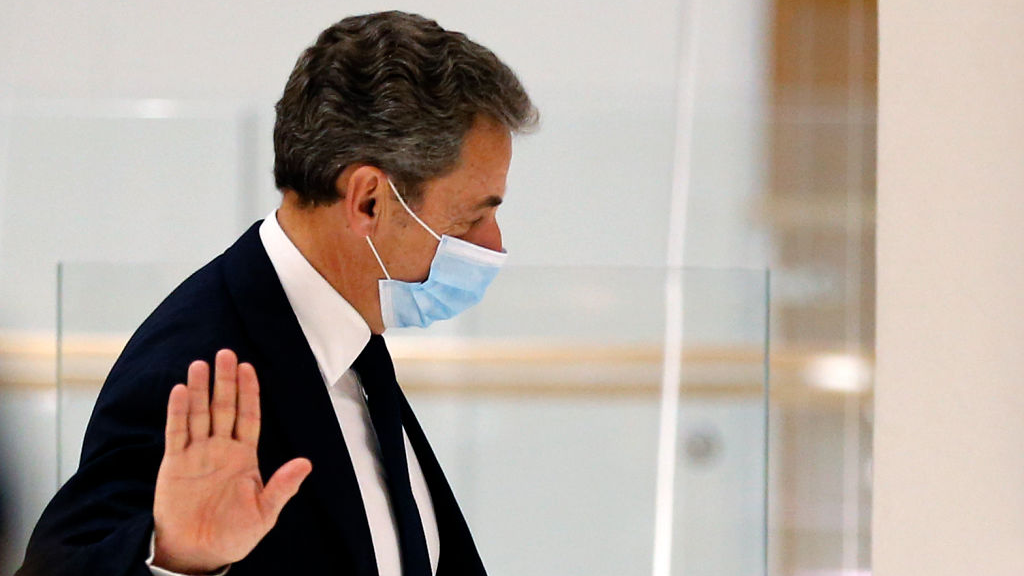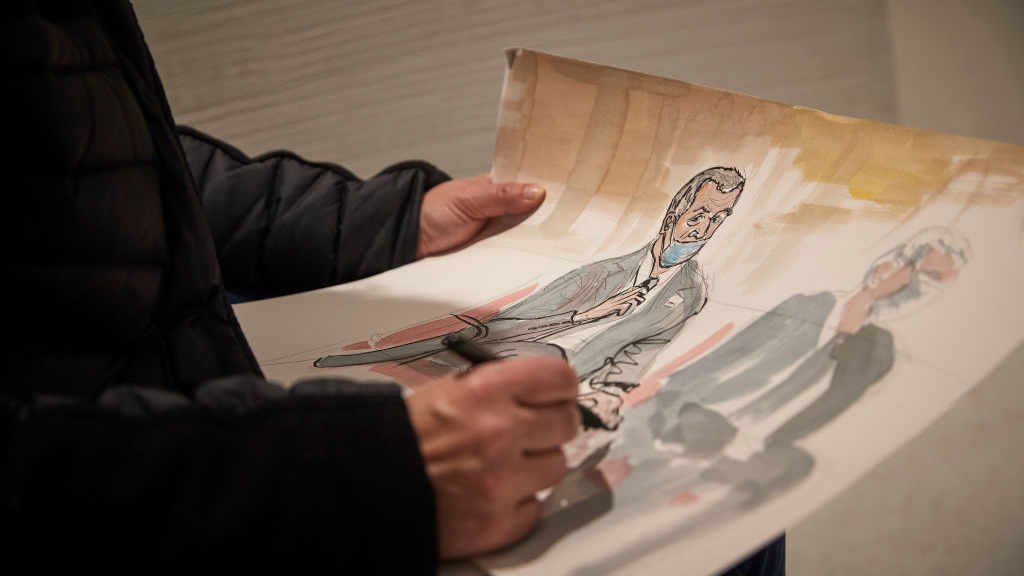
Former French president Nicolas Sarkozy waves as he leaves the courtroom after the first day of his trial on corruption charges in the so-called "wiretapping affair" in Paris, France, November 23, 2020. /Getty
Former French president Nicolas Sarkozy waves as he leaves the courtroom after the first day of his trial on corruption charges in the so-called "wiretapping affair" in Paris, France, November 23, 2020. /Getty
Editor's note: Freddie Reidy is a freelance writer based in London. He studied history and history of art at the University of Kent, Canterbury, specializing in Russian history and international politics. The article reflects the author's opinions, and not necessarily the views of CGTN.
On November 23, former French President Nicolas Sarkozy appeared in court, charged with corruption. Sarkozy's appearance is the first time a French president has appeared in the dock since the wartime Vichy leader, Marshal Pétain, in 1945. Many will be wondering what gave rise to such a situation and what it implies about French politics today.
In what has become known as "the wiretapping case", Sarkozy stands charged with offering a magistrate a glamorous job in the principality of Monaco, in exchange for insight into a separate investigation into Sarkozy's campaign financing, the so-called "Bygmalion Affair". The magistrate, Gilbert Azibert, also stands trial for the same charge of corruption. The case was adjourned on Monday until Thursday while a medical assessment of Azibert is undertaken. Azibert, 73, had argued that he should not appear in court, as the risk of COVID-19 exposure is severe due to a heart condition.
Indeed, Azibert's reluctance to appear in court is matched by Sarkozy, who has for six years, tried to avoid the case being heard. Arguing that, "Once again my innocence is being trampled on by a decision that presents no evidence at all of illicit financing."
While using an alias on a phone call to his lawyer Thierry Herzog, Sarkozy was said to have discussed influencing Azibert on 12 separate occasions. In one of which he told Herzog, "I'll get him promoted, I'll help him."
Sarkozy denies any impropriety and references the fact that Azibert never received such a promotion. "Azibert got nothing, I made no approach, and I've been rejected by the Court of Cassation (France's highest appeals court)" he protested in 2014.
While it is true that he never received a promotion, what is vital to the case, is whether an offer was made or not. Under French law, a promise or offer constitutes corruption even if it is not acted upon.
While Sarkozy is the first former president to appear in court, he is not the first to be charged. Sarkozy's predecessor and mentor, the late Jacques Chirac was charged in 2011 for misappropriation of funds during his tenure as Mayor of Paris. In fact, over the years, there has been a litany of high-ranking political figures who have been brought through French courts.
Aside from two ex-presidents, former French government minister and IMF director Dominque Straus-Kahn received a high-profile hearing on charges of sexual misconduct in addition to financial scandals. Even highly respected French figures such as Christine Lagarde, the current ECB President, have been found guilty of having left office, although in this case without charge.

A court artist finishes a painting of former French President Nicolas Sarkozy's on the first day of his corruption trial in Paris, France, November 23, 2020. /Getty
A court artist finishes a painting of former French President Nicolas Sarkozy's on the first day of his corruption trial in Paris, France, November 23, 2020. /Getty
The French political establishment was again rocked during the 2017 presidential campaign when the front-runner, François Fillion, failed to make the final run-off as his campaign was derailed by a series of scandals. Fillon had been prime minister in Sarkozy's cabinet and had, in fact, beaten his former boss during the primary for Les Républicans along with former Prime Minister Alain Juppé.
Due to the rules of the election, Les Républicans were unable to replace Fillon as a candidate, and consequently, the party finished last before the final vote, where all parties threw their support behind the eventual winner, Emmanuel Macron, in defiance of nationalist Marine Le Pen.
Sarkozy, although officially retired, remains an influential figure in center-right politics. Having garnered a reputation for toughness during his time as Interior Minister, he often sees spikes in his popularity during times of social unrest and an increased threat of terrorism such as now. His popularity was witnessed during the launch of his latest memoir, "The Time of Storms", where hoards of the faithful gathered.
It is perhaps with this renewed confidence in his popularity that he has positioned his defense. A defense not against the charges, which could lead to €1 million ($1.2 million) fine and a ten-year prison sentence, but against the system and judiciary, a judiciary he is claiming is pursuing a vendetta. "I am combative, I have no intention of being accused of things I haven't done. I'm not corrupt and what has been inflicted on me is a scandal that will rest in the annals. The truth will out."
Attempting to speak on behalf of the people, against the judiciary, is a high-risk stratagem but perhaps one in keeping with Barack Obama's observations of the former president in his recently released memoir, "swooping from flattery to bluster to genuine insight, never straying from his primary, barely disguised interest, which was to be at the center of the action."
Sarkozy's popularity and resilience have often been underestimated, unlike many, the former president will view the trial as an opportunity rather than a threat, treading a fine line as disdain with the political class, mounts. The trial resumes on Thursday, the "Bygmalion affair" follows in 2021.
(If you want to contribute and have specific expertise, please contact us at opinions@cgtn.com.)

